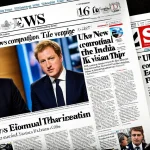Immediate political and diplomatic shifts after Brexit
Immediately following Brexit, the UK’s political standing underwent significant transformation. No longer part of the EU’s political framework, the UK had to redefine its diplomatic posture. This shift was marked by a move toward asserting sovereignty and crafting independent policies, contrasting with the prior integration within EU structures.
Early diplomatic responses from the EU and other nations reflected a mix of cautious pragmatism and uncertainty. EU states focused on preserving unity, emphasizing the importance of upholding negotiated agreements, while many non-EU countries adopted a wait-and-see approach, cautiously engaging with the UK as it navigated its new status.
Additional reading : How does UK news coverage compare to global media perspectives?
The Brexit aftermath also saw short-term impacts on existing international agreements. Some treaties previously facilitated through EU membership required renegotiation or separate bilateral arrangements. As a result, the UK faced urgent diplomatic challenges to maintain continuity in trade, security, and cooperation agreements while establishing a distinct international presence.
These immediate shifts underscored the complexity of disentangling decades-long political ties and highlighted the need for the UK to rebuild its international relations framework quickly and effectively to sustain its new global role.
This might interest you : What Are the Upcoming Changes in the UK Energy Policy?
Economic impacts and global trade partnerships
Exploring Brexit economic effects and shifts in UK trade
The Brexit aftermath has profoundly reshaped the UK’s approach to global trade. With its exit from the EU single market, the UK lost tariff-free access to its biggest trading partner, necessitating urgent negotiation of new trade agreements. This shift required UK officials to swiftly leverage trade diplomacy to secure deals that would mitigate disruption and stabilize commerce.
Early diplomatic efforts focused on strengthening ties with key economies, including large non-EU partners such as the United States, Australia, and emerging markets. The UK prioritized bilateral and multilateral agreements outside Europe to diversify its trade portfolio. Although some deals replicated elements of EU arrangements, many involved novel terms tailored to Britain’s new sovereign trading status.
Economic data since Brexit reflect mixed outcomes. UK trade volumes with the EU declined initially, impacted by customs checks and regulatory divergence. Conversely, trade with non-EU countries has seen gradual growth, attributed to new agreements and targeted diplomatic outreach. However, some sectors, especially manufacturing and agriculture, faced immediate challenges adapting to changed supply chains and export rules.
The UK’s shifting role in global markets has also affected its economic influence within Europe. While the UK remains a significant economic power, its departure altered intra-European trade dynamics, prompting realignments among remaining EU members. The Brexit economic effects underscore the importance of agile trade policy and the ongoing task of balancing legacy ties with new international partnerships.
The UK’s evolving foreign policy and strategic alliances
Understanding Britain’s new global stance beyond the EU
In the Brexit aftermath, the UK’s foreign policy underwent significant recalibration. Freed from EU constraints, UK diplomacy now centers on establishing a distinctive global presence, focusing on UK foreign policy priorities that emphasize sovereignty and flexible partnerships. This shift entails moving beyond Europe to cultivate global alliances that can advance British interests economically, politically, and militarily.
One key aspect has been reorienting defense and security strategies. The UK reaffirmed its commitment to NATO while also strengthening emerging security pacts like AUKUS, a trilateral alliance with Australia and the United States aimed at Indo-Pacific stability. These moves reflect a deliberate effort to maintain strategic relevance and contribute robustly to international security outside traditional EU frameworks.
Concurrently, the UK has intensified diplomatic outreach to forge new partnerships worldwide. From trade agreements to security cooperation, these efforts are designed to diversify the UK’s international network. Such partnerships include closer ties with Commonwealth countries and engagement in multilateral institutions where the UK seeks to wield influence independently. This evolution in UK diplomacy signals a proactive Brexit strategy, balancing legacy relationships with ambitious new alliances to secure the country’s future role on the global stage.


